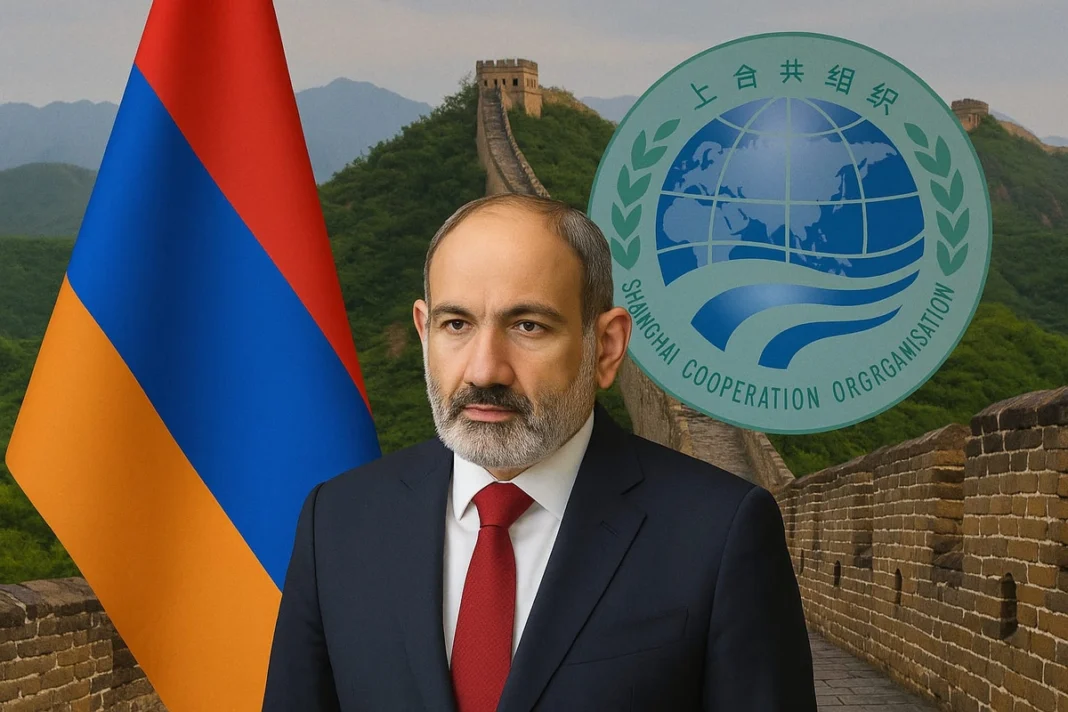By Marrahim Nasib
Armenia has officially expressed its intent to become a full-fledged member of the Shanghai Cooperation Organization (SCO) — a move that signals Yerevan’s ongoing recalibration of its foreign policy amid souring ties with traditional ally Russia. Currently holding observer status, Armenia originally joined the SCO as a dialogue partner in 2016.
Why Is Armenia Seeking SCO Membership Now?
Historically, Armenia has aligned itself with Russian-led blocs like the Collective Security Treaty Organization (CSTO), the Eurasian Economic Union (EAEU), and the Commonwealth of Independent States (CIS). But under Prime Minister Nikol Pashinyan, these ties have weakened. Growing disillusionment with Moscow—particularly after perceived failures of the CSTO—and Armenia’s pivot toward the West have pushed Yerevan to explore alternative security and diplomatic platforms.
Enter the SCO—an alliance that includes China, Russia, India, Pakistan, and Central Asian states—offering both geopolitical heft and economic opportunities. Armenia sees SCO membership as a chance to diversify its partnerships and avoid being squeezed between two rival blocs.
Moreover, unresolved tensions with Azerbaijan continue to cast a shadow over Armenia’s security and development prospects. Joining a multilateral organization like the SCO, where Azerbaijan also holds dialogue partner status, could force Yerevan to adopt more conciliatory positions and align with international norms on sovereignty and territorial integrity.

The Catch: Principles and Political Trade-Offs
SCO membership is not just symbolic. It comes with a clear set of foundational principles, including respect for sovereignty, territorial integrity, and non-interference in domestic affairs. Armenia, by joining, would be tacitly acknowledging Azerbaijan’s territorial claims—an issue that could accelerate constitutional reforms in Yerevan to drop lingering irredentist language.
While SCO countries like China, Iran, and Russia share complicated or even adversarial ties with the West, Armenia’s Western outreach—particularly toward the EU and the U.S.—makes its bid for SCO membership strategically complex. Critics argue Yerevan is once again attempting a multi-vector foreign policy, trying to hedge its bets on all sides. But full membership would demand more than good intentions—it would require long-term alignment with the bloc’s geopolitical ethos.
What Would SCO Membership Mean for the South Caucasus?
Armenia’s interest in the SCO signals its search for new diplomatic and economic lifelines, but it could also reshape the power dynamics in the South Caucasus. The SCO’s emphasis on regional cooperation and mutual recognition of sovereignty could provide diplomatic leverage for Azerbaijan, potentially nudging Armenia toward more constructive engagement in peace talks.

Key SCO values—such as mutual respect, sovereignty, non-interference, and win-win cooperation—could help facilitate a more stable and rules-based environment in the region. However, whether Armenia’s SCO ambitions translate into tangible change depends on its willingness to adhere sincerely to these principles and take credible steps toward resolving its disputes with Baku.
In the end, Armenia’s SCO bid is not just about diplomacy—it’s a test of its strategic direction in a rapidly evolving global order. Whether this move unlocks new opportunities or adds to geopolitical friction will largely depend on how Yerevan navigates the competing demands of East and West.


